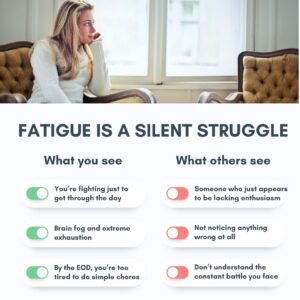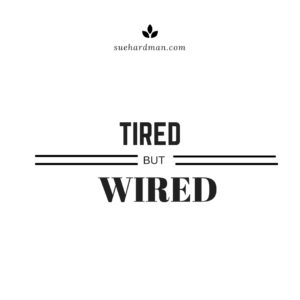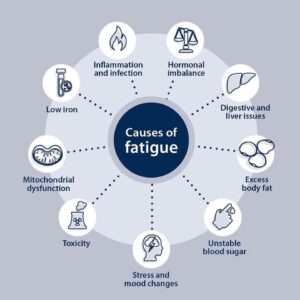A bit of back story here. When my son was born, I was studying to be a Naturopath at the same time, and with the added pressure of being a new mum, staying on top of my course, and throw in a new baby that didn't want to sleep - I ended up with hyperthyroidism, 'adrenal fatigue' or what is now referred to as adrenal dysfunction.
Fortunately, for me I had access and help from health experts through my course, to help me manage my exhaustion and get through those early years. I have been there and can relate to working women who are looking to regain and restore their energy levels.
If you’re feeling a tired or flat.....you don’t have the energy to do all those things you want to do – You’d planned to come up with new ideas for your business, be super productive ticking off your daily to-do-list, make changes to your eating habits, get fit, lose weight…………
BUT what if you don't feel like it because you just don’t have the necessary energy or motivation to do all those things? You're just feeling flat, tired and unmotivated BUT everyone thinks you've got it together - You’re not alone, way too many women feel this way.
Yes, it's all very well that people say, ‘just do it’, or get organised and have a plan so you can get more sh*t done.
Coffee’s not going to do it, it usually makes things worse, it’s a small energy boost that usually leads to an energy crash later and a serious knock-on effect to a poor nights sleep.
Fatigue can be a silent struggle that others may not fully understand.
How others may see you:
- From the outside, they might see someone who just appears to be lacking enthusiasm.
- Or they might not notice anything wrong at all.
- They don’t understand the constant battle you face and the impact it has on your daily life.
What you’re feeling:
- Inside, you’re fighting just to get through the day.
- You arrive at work with brain fog and extreme exhaustion, even though you woke up a few hours ago.
- By the end of the day, you’re too tired to cook, play with the kids, or do some simple self-care, even though you really need it.
What Stage Are you In? Flat, Exhausted or Chronically Fatigued?
Are you experiencing afternoon slumps, feeling tired all day, “burnt out,” “run down” or “worn out.” Apparently for no apparent reason!
The Role of Stress & Your Flagging Energy Levels.
Your tiny adrenal glands have many responsibilities, including responding to stress and the situations that cause it. They give us the energy and strength for “fight or flight” in crisis situations by pumping adrenaline and cortisol throughout the body to mobilise resources for this effort. It’s what helped keep us alive for millennia.
The most common health issues arising from long term stress. Having elevated cortisol has an effect on your blood sugar, insulin, blood pressure, immune function, gut health, sex hormones, sleep, mood, memory, cell growth and repair, digestion and thyroid function.
How To Recognise If Your Adrenals Have Become Dysregulated
More than 3-5 symptoms indicate that you are likely to have a problem with dysregulated adrenal function.
- A feeling you’re constantly racing from one task to the next?
- Feeling wired yet tired?
- A second wind that keeps you up late?
- Difficulty falling asleep or disrupted sleep?
- A feeling of anxiety or nervousness—can’t stop worrying about things beyond your control?
- A quickness to feel anger or rage?
- Memory lapses or feeling distracted, especially under duress?
- Sugar cravings (you need “a little something” after each meal, usually of the chocolate variety)?
- Dreaded abdominal fat, or muffin top—not bloating?
- Skin conditions such as eczema or thin skin?
- Bone loss?
- High blood pressure or rapid heartbeat?
- High blood sugar?
There are two big problems in our modern world:
#1: Your body can’t detect the difference between life-threatening danger (tiger chasing you) versus when you feel mentally or emotionally stressed (running late), your body reacts exactly the same way – releasing cortisol.
#2: Today’s stress is continuous — perhaps relentless. Fight-or-flight situations are supposed to be short lived, giving your body the chance to recover from the negative effects of cortisol and adrenaline. The constant stress means your adrenal glands must work overtime to keep up.
When scientists measure stress, they find that stress is a function of both demands and control: the greater the demands on you and the lower your control over the outcomes, the higher your stress.
A challenging job, constantly juggling, worrying, taking care of children or elderly parents, skimpy sleep, eating poorly, over-or under-exercising, living in a troubled relationship — are all common examples of high-demand, low-control situations that many women are experiencing.
What is the downward spiral from being worn out, then burnout and finally adrenally fatigue?
Stage 1: Wired and tired
This starts of when you feel wired most of the time, due to an extended release of adrenaline and cortisol in response to a high stress load. You may even think you’re handling everything just fine because it feels as if you’re getting so much done.
Further down the line, as your normal daily cortisol cycle continues to be disrupted by trying to manage more and more stress, you can become both wired and tired.
Stage 2: Stressed and tired
This is the phase you say you feel so wiped out that you can’t get out of bed in the morning, but when it’s time to go to sleep at night, you’re wide awake for hours.
Stage 3: Burnout
The final stage of chronic exhaustion, is when you feel tired all the time, with no energy at all. At this point, cortisol levels decline drastically as the natural rhythms between the brain and the adrenal glands become so disrupted that the adrenal glands stop functioning normally.
At this point, women feel truly exhausted and find it difficult to carry out even simple daily activities.
Emma, a 40 year old full-time working mom with two kids. She works a full day and has no help at home, she pretty much does everything herself!
On the weekends, between her kids’ extra-curricular sports and activities, she rarely has time to relax. When she goes on holiday, they're more like sightseeing missions than an actual time to rest.
Initially, Emma felt like she could handle her busy, stressful life as she felt motivated and energised. But as time went by, the feeling of being able to handle things started to diminish.
Getting to sleep at night became more difficult as she often felt 'tired but wired'. She began waking up early in the morning, around 3-4am, and found herself unable to fall back asleep. Mornings became challenging as she often woke feeling unrested, even when she did sleep 8 or 9 hours.
She started to experience blood sugar crashes. She found that she needed to eat more frequently and often craved salt and sweets. She also noticed she was starting to gain weight around her abdomen even though she hadn’t done anything to change her diet. Exercise, which once helped her feel good, now made her feel exhausted.
As things started to deteriorate, life was no longer easy to manage. Work now easily overwhelmed her, and she had little energy for her family or friends.
Can you relate?
This is a common experience. What Emma has going on is Adrenal Fatigue or HPA axis dysfunction.
Stress-driven cortisol levels cause all sorts of issues over time, including:
- suppressing the immune system
- raising blood sugar
- ruining sleep-wake cycles
- wrecking digestion
Stress can be a killer because it is a driving factor in most major chronic diseases. It raises the rates of everything from unhealthy weight gain and hypothyroidism to early aging, heart disease and cancer.
If your goal is to kick burnout for good in 2024, then you need a holistic strategy.
A strategy that accounts for the myriad ways that stress impacts your mind AND your body.
Quitting your job won’t cut it.
One or two yoga classes a week won’t cut it either.
Chronic stress wreaks havoc on your hormones, your gut, and your nervous system.
You need to establish your top stressors and deal with them, they’re usually not as obvious as you think.
You likely need to do a little fine-tuning of your diet. More foods with the nutrients you need. Less foods that irritate your gut and cause inflammation and wild blood sugar (read: energy & mood) swings.
On the other hand you probably need to make some shifts in your daily life. You need solid but simple routines that keep you grounded, make you more resilient to stress, and fuel you with energy- while not completely disrupting your life.
You may need to take stock of what’s draining your energy and be more discerning with your “Yes’s” and “No’s”.
You can do this. Not overnight, but I promise it’s possible!
Final Word
Stress and the effect it has on your adrenal issues, is the root of many hormone imbalance. There are many ways to support your adrenal health — from targeted supplements to key lifestyle changes.
If you suspect that you have adrenal issues, consider working with professional.
As you head in a healthier direction, you’ll feel stronger and more resilient, and your life will change for the better.





 Dr. Nikolai Lazarev defines an adaptogen ‘as an agent that allows the body to counter adverse physical, chemical, or biological stressors and allows the body to “adapt” to the stressful circumstances’ and use oxygen much more efficiently.
Dr. Nikolai Lazarev defines an adaptogen ‘as an agent that allows the body to counter adverse physical, chemical, or biological stressors and allows the body to “adapt” to the stressful circumstances’ and use oxygen much more efficiently. Of course if adaptogens can benefit a well trained athlete, thenimagine how that can help you with your anxiety, ongoing exhaustion and stressful lives.
Of course if adaptogens can benefit a well trained athlete, thenimagine how that can help you with your anxiety, ongoing exhaustion and stressful lives.
